 Your new post is loading...
 Your new post is loading...
From Blade Runner to I, Robot, the big screens of Hollywood have predicted the rise of the machine. Automated intelligences will wait our tables and drive our cabs. They will serve us by performing menial tasks. But fact is now surpassing fiction. Automation has moved beyond the factory assembly line as computers are diagnosing illnesses, providing legal counsel, and make financial and political decisions. And if artificial intelligence really is faster, smarter and more reliable, what are we left with?
The answer is precisely that element which makes us less efficient and slower. Our humanity. But rather than being seen as a weakness, this is actually our strongest suit. It’s one we need to empower, because studies show that as the world becomes increasingly automated, computerised and digitalised, we are losing the very skills that define us as human. Just when we need them the most.
Our empathy is something that computers will always struggle to emulate. We need to celebrate what makes us different from even the smartest of the machines. While the future belongs to those who are able to navigate this increasingly digitalised world of ours, the choicest spoils will fall to those who can combine technological fluency with emotional intelligence. Learn more / En savoir plus / Mehr erfahren: https://www.scoop.it/t/21st-century-learning-and-teaching/?&tag=Empathy https://www.scoop.it/t/21st-century-learning-and-teaching/?&tag=Emotional+intelligence
Via Gust MEES, Jim Lerman
What would you say are a few of the biggest myths about growth mindset?
OK, myth No.1 is the myth that it’s all about effort, and that you instil it by praising effort. Effort is one factor that leads to learning. So the ultimate value is growth, progress, learning. And effort is one thing that leads there but there are many other things – strategies, using resources, getting advice, guidance and mentorship, and when people leave that out and just praise effort, it’s not transmitting a growth mindset. Adults have nagged children for centuries to try harder. That’s not a growth mindset, it’s an adult nagging a child to try harder!
Also, we find that when teachers think it’s just about effort and praising effort they may praise effort that isn’t even there, or that’s not effective. So if a child tries hard at something and you say ‘great job, you tried hard’, but they didn’t make progress, they didn’t advance, you’re actually conveying a fixed mindset because you’re saying ‘great effort, I didn’t really expect you to do that, and I don’t expect you to do that, so I’m trying to make you feel good about not doing it’. So we need people to understand that it’s appreciating a variety of process variables that lead to learning.
The second myth is that you can teach students a lesson on growth mindset and put a poster up in the front of the room, and that’s that, that they will have a growth mindset from then on. And we know if the teacher doesn’t then embody a growth mindset, if teachers don’t embody growth mindsets in their teaching practices, in the way that they give feedback when the child is stuck, and the way they present a new unit, in the way that they give opportunities for revision and growth of understanding – if they don’t embody that growth mindset, they are not teaching it. And in fact, if their behaviour contradicts the poster at the front of the room, then maybe they’re doing a disservice. Learn more / En savoir plus / Mehr erfahren: http://www.scoop.it/t/21st-century-learning-and-teaching/?&tag=carol+dweck http://www.scoop.it/t/21st-century-learning-and-teaching/?&tag=Growth+Mindset
Via Gust MEES, Jim Lerman
A new study lends credence to what you’ve probably always suspected: social media is having a pretty negative effect on teenagers — Instagram and Snapchat being the worst culprits. The study, published today and called “Status of Mind,” was conducted by researchers for the Royal Society for Public Health in the UK. The researchers surveyed 1,479 British youths ages 14-24, asking them how they felt the different social media networks effected their mental health. They took in several factors such as body image, sleep deprivation, bullying, and self-identity. The results suggest the two worst social media networks for kids are Instagram and Snapchat, as they had terrible scores for body image, bullying, and anxiety. Twitter and Facebook weren’t much better, though. YouTube was the only one that apparently inspired more positive feelings than negative ones. Learn more / En savoir plus / Mehr erfahren: http://www.scoop.it/t/social-media-and-its-influence
Via Gust MEES, Jim Lerman
Empowerment of people through Media and Information Literacy (MIL) is an important prerequisite for fostering equitable access to information and knowledge and promoting free, independent and pluralistic media and information systems. Media and Information Literacy recognizes the primary role of information and media in our everyday lives. It lies at the core of freedom of expression and information - since it empowers citizens to understand the functions of media and other information providers, to critically evaluate their content, and to make informed decisions as users and producer of information and media content. Learn more / En savoir plus / Mehr erfahren: http://www.unesco.org/new/en/communication-and-information/media-development/media-literacy/mil-as-composite-concept/
Via Gust MEES, Jim Lerman
Teacher professional learning is of increasing interest as one way to support the increasingly complex skills students need to learn in preparation for further education and work in the 21st century. Sophisticated forms of teaching are needed to develop student competencies such as deep mastery of challenging content, critical thinking, complex problem-solving, effective communication and collaboration, and self-direction. In turn, effective professional development (PD) is needed to help teachers learn and refine the pedagogies required to teach these skills. However, research has shown that many PD initiatives appear ineffective in supporting changes in teacher practices and student learning. Accordingly, we set out to discover the features of effective PD. This paper reviews 35 methodologically rigorous studies that have demonstrated a positive link between teacher professional development, teaching practices, and student outcomes. We identify the features of these approaches and offer rich descriptions of these models to inform those seeking to understand the nature of the initiatives. Learn more / En savoir plus / Mehr erfahren: https://gustmees.wordpress.com/?s=coaching https://gustmees.wordpress.com/?s=professional+development
Via Gust MEES, Jim Lerman
The European Commission has just published the final report of the study "ICT for Work: Digital Skills in the Workplace" on the impact of information and communication technologies (ICT) on the transformation of jobs and skills. "Conclusions and recommendations. The evidence shows that digital technologies are increasingly and extensively used across the economy. However, digital skills appear to be currently required mostly for the high-skilled and, to a lesser extent, medium-skilled employees to perform their job tasks, and are less likely to be required for the low-skilled or the unskilled (or frequently not required at all, even at basic level). These polarising trends, confirmed also by other available evidence, draws attention to the fact that a high share of workers in low-skilled occupations whichdo not require (or require to a very limited extent) digital skills. This dichotomy risks widening the digital divide, leaving a proportion of workers lagging behind and at risk of digital exclusion, who would hence benefit from specific attention. "Another finding regards the availability of digital skills, which is not always sufficient to meet employers’ needs, as demonstrated by the reported existence of digital skills gaps in the workforce, even as regards basic digital skills. Different factors contribute to this situation. The speed at which workers are being provided with the right digital skills in the right locations is frequently slower than the speed at which digital technologies are evolving. As a result, digital skills are often also more subject to obsolescence. An age-related issue can also be identified, as older workers are less likely to be equipped with digital skills than younger workers. Results show as well that even if workplaces report that a proportion of their workforce is not fully proficient in carrying out tasks involving the use of digital technologies, they often do not recognise that existing in-house skills gaps impact on workplace performance and hence often do not take action to deal with the issue. "Another important result regards the relationship between workplace size and access to digital technologies. For micro and small-sized workplaces, it may not be viable to invest in order to increase ICT use. Also, for those micro and small-sized employers who have a high demand for digital skills, simply allocating staff time to acquire them is both difficult (loss of productive time), and expensive (training and development programmes need to be brought in). This is less an issue for bigger employers with more available resources who can manage capacity, develop training programmes or buy them in. But it is also important to remember that some micro or small-sized companies consider that they do not need ICT at all, and therefore do not demand digital skills. "Finally, the skills challenges appear highly dispersed, as different sectors have different demands, and the balance of supply and demand is different across Member States. The sectoral analysis indicates that the use of digital technologies is uneven across economic sectors, particularly concerning the types of digital technologies, their speed of penetration and also the related demand for digital skills, with some sectors clearly leading the ‘digital revolution’ and some others following at a slower pace. "Conclusions and recommendations. The evidence shows that digital technologies are increasingly and extensively used across the economy. However, digital skills appear to be currently required mostly for the high-skilled and, to a lesser extent, medium-skilled employees to perform their job tasks, and are less likely to be required for the low-skilled or the unskilled (or frequently not required at all, even at basic level). These polarising trends, confirmed also by other available evidence, draws attention to the fact that a high share of workers in low-skilled occupations whichdo not require (or require to a very limited extent) digital skills. This dichotomy risks widening the digital divide, leaving a proportion of workers lagging behind and at risk of digital exclusion, who would hence benefit from specific attention. "Another finding regards the availability of digital skills, which is not always sufficient to meet employers’ needs, as demonstrated by the reported existence of digital skills gaps in the workforce, even as regards basic digital skills. Different factors contribute to this situation. The speed at which workers are being provided with the right digital skills in the right locations is frequently slower than the speed at which digital technologies are evolving. As a result, digital skills are often also more subject to obsolescence. An age-related issue can also be identified, as older workers are less likely to be equipped with digital skills than younger workers. Results show as well that even if workplaces report that a proportion of their workforce is not fully proficient in carrying out tasks involving the use of digital technologies, they often do not recognise that existing in-house skills gaps impact on workplace performance and hence often do not take action to deal with the issue. "Another important result regards the relationship between workplace size and access to digital technologies. For micro and small-sized workplaces, it may not be viable to invest in order to increase ICT use. Also, for those micro and small-sized employers who have a high demand for digital skills, simply allocating staff time to acquire them is both difficult (loss of productive time), and expensive (training and development programmes need to be brought in). This is less an issue for bigger employers with more available resources who can manage capacity, develop training programmes or buy them in. But it is also important to remember that some micro or small-sized companies consider that they do not need ICT at all, and therefore do not demand digital skills. "Finally, the skills challenges appear highly dispersed, as different sectors have different demands, and the balance of supply and demand is different across Member States. The sectoral analysis indicates that the use of digital technologies is uneven across economic sectors, particularly concerning the types of digital technologies, their speed of penetration and also the related demand for digital skills, with some sectors clearly leading the ‘digital revolution’ and some others following at a slower pace."
Via Gust MEES
|
Education may be the passport to the future, but for all the good teaching out there, it would seem that schools are failing to impart some of the most important life skills, according to one educational expert.
Dr. Tony Wagner, co-director of Harvard's Change Leadership Group, argues that today’s school children are facing a “global achievement gap”, which is the gap between what even the best schools are teaching and the skills young people need to learn.
This has been exacerbated by two colliding trends: firstly, the global shift from an industrial economy to a knowledge economy, and secondly, the way in which today’s school children – brought up with the internet – are motivated to learn.
In his book The Global Achievement Gap, Wagner identifies seven core competencies every child needs in order to survive in the coming world of work.
1. Critical thinking and problem-solving 2. Collaboration across networks and leading by influence 3. Agility and adaptability 4. Initiative and entrepreneurialism 5. Effective oral and written communication 6. Accessing and analysing information
Via Gust MEES, Jim Lerman
It's important to recognize that a growth mindset is an overall paradigm for personal development rather than a pedagogical tool for measuring academic accomplishment. 5 Growth Mindset PracticesIn their groundbreaking book, Professional Learning Communities at Work, Richard DuFour and Robert Eaker say it clearly when pointing out the issue that comes about when change initiatives are considered "a task to complete rather than an ongoing process." If we really want to improve our schools, our work, and the education of our students, we can do so by adopting a new mindset -- for everyone -- that would include: - Being humble enough to accept that there are things about ourselves and our practices that can improve
- Becoming part of professional teams that value constructive critique instead of criticism
- Treating setbacks as formative struggles within the learning process instead of summative failures
- Realizing the restrictive role that timelines can play in reaching high standards, and using foundational philosophies such as Universal Design for Learning (UDL) to map systems so that everyone's growth is supported
- Create flexible grouping at all times so that nobody's trapped in any one course level or particular type of work.
Learn more / En savoir plus / Mehr erfahren: http://www.scoop.it/t/21st-century-learning-and-teaching/?&tag=Growth+Mindset
Via Ana Cristina Pratas, Miloš Bajčetić, Gust MEES, Jim Lerman
It is almost universally acknowledged that in order to succeed in the 21st century, students must learn much more than the “three Rs” and basic computer competency. The term “21st century skills” is used often in educational circles to refer to a range of abilities and competencies that go beyond what has traditionally been taught in the classroom, including problem solving, communication, collaboration, creativity and innovation. Others define the term as “information literacy, media literacy, and information, communication and technology literacy.” More importantly, students need these skills because employers across a huge variety of industries increasingly demand them. A recent McKinsey report indicated that close to 40 percent of employers could not find people with the right skills while 60 percent “complain[ed] of a lack of preparation.” Even jobs that were once considered vocational, such as welding, petroleum production, and even factory work, are now high tech, and require specialized knowledge that includes not only a robust science background and familiarity with the computerized machinery that keeps heavy industry humming, but also critical thinking and collaboration skills. In other words, 21st century job growth is outpacing our ability to develop a prepared workforce, making it more critical than ever to teach these skills. Learn more / En savoir plus / Mehr erfahren: https://gustmees.wordpress.com/2015/07/19/learning-path-for-professional-21st-century-learning-by-ict-practice/ https://gustmees.wordpress.com/2015/10/29/if-i-would-own-a-company-what-skills-would-i-expect-from-my-workers-in-21st-century/
Via Gust MEES
During this time of significant educational change, we are forced to ask ourselves, what is the role of the teacher?
Teachers continue to be central to learning, but the role is changing significantly. Our children still need to develop real skills and real knowledge, but they also need to be self-reliant, resilient, and fully capable of re-inventing themselves. This means students must learn how to self-direct their learning.
So if students are self-directing their learning, what's the role of the teacher?
Teachers build the curriculum/lessons with the individual student based on his/her needs and interests rather than move through a fixed curriculum en masse.
Teachers provide the experiences and tools to access new knowledge in specific areas of interest as facilitators of individual pathways, rather than being a provider of the content or expert in one or every area,Teachers become experts in how people learn, not only in teaching.
Teachers support a community of learners in teams, possibly of multiple ages, rather than alone in classrooms with fixed grades of students.
Teachers have more autonomy over their daily schedule, and can be flexible to adjust their schedules to support student needs.
Teachers provide opportunities for real-world, connected, practical learning rather than isolated academics.
These are the types of changes in the teacher's role that are fundamental to developing students who are capable of independent learning and reinvention in a rapidly changing world.
Learn more / En savoir plus / Mehr erfahren: https://gustmees.wordpress.com/2013/05/25/so-whats-the-change-for-teachers-in-21st-century-education/
Via Gust MEES, Jim Lerman
Exponential technologies have a tendency to move from a deceptively slow pace of development to a disruptively fast pace. We often disregard or don’t notice technologies in the deceptive growth phase, until they begin changing the way we live and do business. Driven by information technologies, products and services become digitized, dematerialized, demonetized and/or democratized and enter a phase of exponential growth. Nicole Wilson, who was Singularity University’s vice president of faculty and curriculum until last year, believes education technology is currently in a phase of deceptive growth, and we are seeing the beginning of how exponential technologies are impacting 1) what we need to learn, 2) how we view schooling and society and 3) how we will teach and learn in the future. [Gust MEES] Simply put, as WE (#Schools) DON'T know WHAT THAT world would be, WE SHOULD prepare the #students #LEARNers for <===> #LEARNing2LEARN to become #LifeLongLEARNing persons! Please check my #blog post <===> https://gustmees.wordpress.com/.../teaching-was.../ <===> #ModernEDU #Coaching
Via Gust MEES
|



 Your new post is loading...
Your new post is loading...



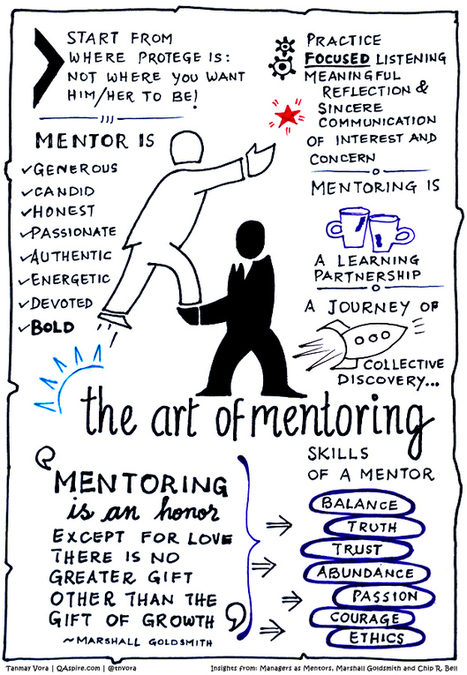







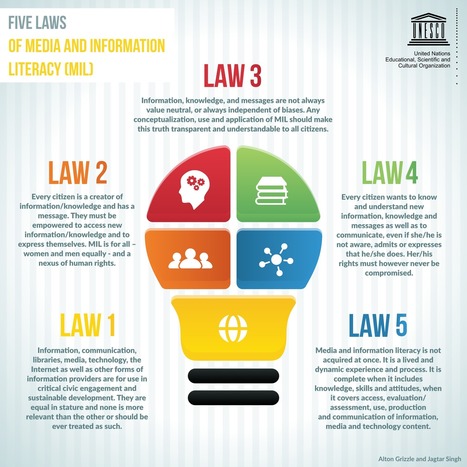








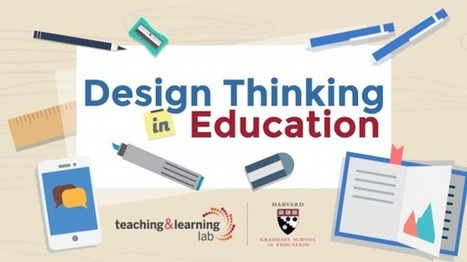

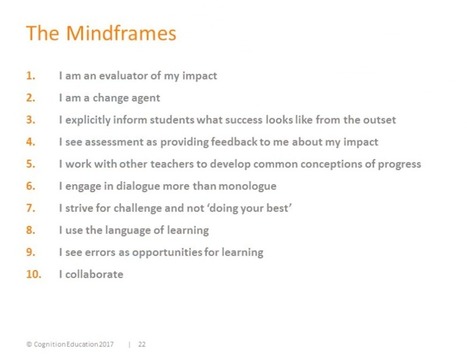
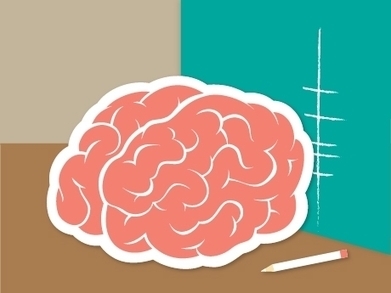



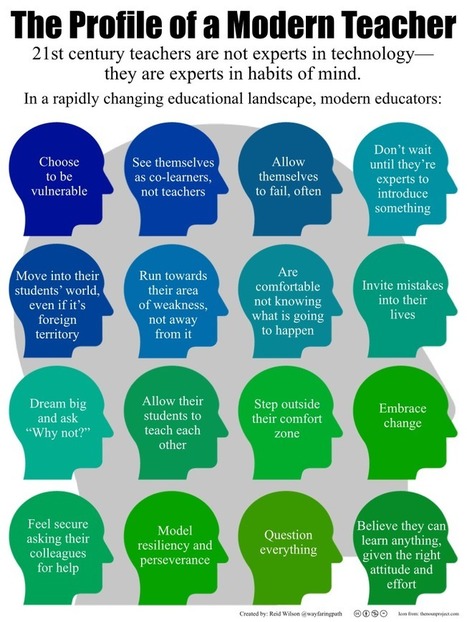



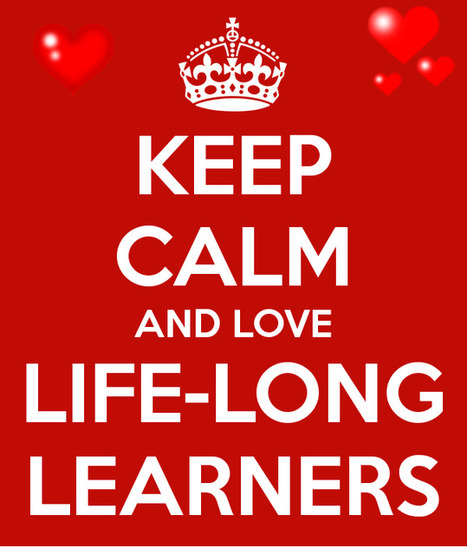





Finally I can see this topic emerge in public discussion about education - something I've been privately preaching about.